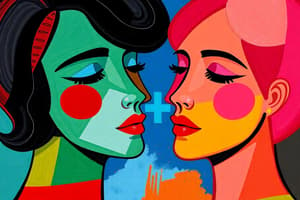Podcast
Questions and Answers
What refers to the social, cultural, and psychological aspects of being male or female?
What refers to the social, cultural, and psychological aspects of being male or female?
- Gender (correct)
- Sex
- Gender expression
- Gender identity
What is the process by which individuals learn and internalize gender roles and expectations?
What is the process by which individuals learn and internalize gender roles and expectations?
- Gender socialization (correct)
- Gender identity formation
- Gender role development
- Gender expression learning
What refers to the unequal distribution of power, resources, and opportunities between men and women?
What refers to the unequal distribution of power, resources, and opportunities between men and women?
- Gender stereotypes
- Gender norms
- Gender-based discrimination
- Gender inequality (correct)
What is a system of social organization in which women hold more power and authority than men?
What is a system of social organization in which women hold more power and authority than men?
What beliefs about the characteristics of men and women are often overly simplified and inaccurate?
What beliefs about the characteristics of men and women are often overly simplified and inaccurate?
What movement advocates for the social, political, and economic equality of women?
What movement advocates for the social, political, and economic equality of women?
Flashcards are hidden until you start studying
Study Notes
Definitions
- Gender: The social, cultural, and psychological aspects of being male or female.
- Sex: The biological characteristics that define males and females, such as chromosomes, hormones, and genitalia.
- Gender identity: A person's internal sense of being male, female, or something else.
- Gender expression: The ways in which a person presents their gender to others, such as through behavior, appearance, and dress.
Gender Roles
- Gender roles: The expectations and norms associated with being male or female in a particular culture.
- Gender stereotypes: Overly simplified and often inaccurate beliefs about the characteristics of men and women.
- Gender socialization: The process by which individuals learn and internalize gender roles and expectations.
Gender and Culture
- Gender norms: The unwritten rules that govern how men and women should behave in a particular culture.
- Patriarchy: A system of social organization in which men hold more power and authority than women.
- Matriarchy: A system of social organization in which women hold more power and authority than men.
Gender and Power
- Gender inequality: The unequal distribution of power, resources, and opportunities between men and women.
- Gender-based discrimination: The unfair treatment of individuals based on their gender.
- Feminism: A movement that advocates for the social, political, and economic equality of women.
Gender Diversity
- Gender binary: The idea that there are only two genders, male and female.
- Gender non-conformity: The failure to conform to traditional gender norms and expectations.
- Genderqueer: A person whose gender identity does not fit into the traditional male/female categories.
- Transgender: A person whose gender identity differs from the sex they were assigned at birth.
Gender Concepts
- Gender refers to the social, cultural, and psychological aspects of being male or female.
- Sex defines the biological characteristics that distinguish males and females, such as chromosomes, hormones, and genitalia.
Gender Identity and Expression
- Gender identity is an individual's internal sense of being male, female, or something else.
- Gender expression is the way a person presents their gender to others through behavior, appearance, and dress.
Gender Roles
- Gender roles are the expectations and norms associated with being male or female in a particular culture.
- Gender stereotypes are overly simplified and often inaccurate beliefs about the characteristics of men and women.
- Gender socialization is the process by which individuals learn and internalize gender roles and expectations.
Gender and Culture
- Gender norms are the unwritten rules that govern how men and women should behave in a particular culture.
- Patriarchy is a system of social organization in which men hold more power and authority than women.
- Matriarchy is a system of social organization in which women hold more power and authority than men.
Gender and Power
- Gender inequality refers to the unequal distribution of power, resources, and opportunities between men and women.
- Gender-based discrimination is the unfair treatment of individuals based on their gender.
- Feminism is a movement that advocates for the social, political, and economic equality of women.
Gender Diversity
- The gender binary is the idea that there are only two genders, male and female.
- Gender non-conformity refers to the failure to conform to traditional gender norms and expectations.
- Genderqueer is a term used to describe individuals whose gender identity does not fit into the traditional male/female categories.
- Transgender refers to individuals whose gender identity differs from the sex they were assigned at birth.
Studying That Suits You
Use AI to generate personalized quizzes and flashcards to suit your learning preferences.




